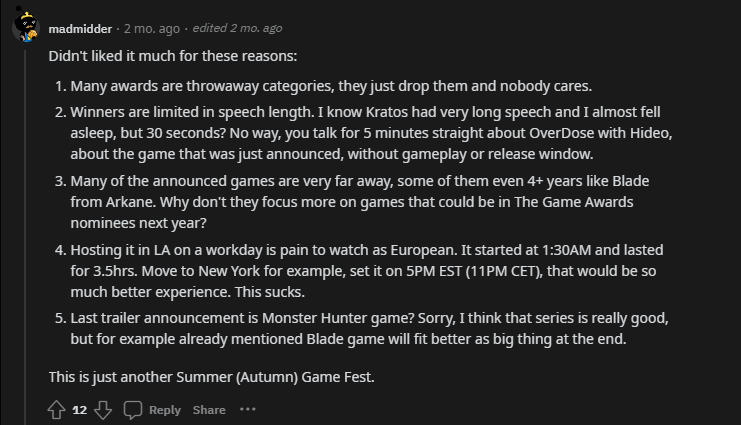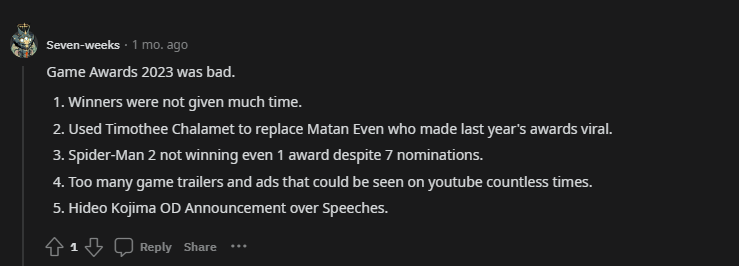The Game Awards (TGA), also known as the Oscars of the gaming world, is generally seen as the most grandiose event in the gaming industry.
However, last year, the event sparked widespread anger in the gaming community.
Many game fans and developers noticed that, during the hours-long ceremony, the time allocated for award-winning game developers to speak was extremely limited.
Spotlight vs Stopwatch
Digital Trends and The Escapist highlighted a stark imbalance in the ceremony’s proceedings, noting that acceptance speeches by award winners were brief, with developers often rushed off stage within 30 seconds to make way for lengthy presentations of upcoming games and celebrity-led segments.
This stark contrast in airtime allocation, particularly the generous segments devoted to industry figures like Hideo Kojima, sparked significant dissatisfaction among viewers.
The frustration was palpable across social media platforms, where the phrase “Please Wrap It Up” became emblematic of the night’s rushed acknowledgments.
This sentiment was widely shared among industry professionals and viewers, who felt that the achievements of game developers, especially those behind major titles such as Elden Ring, God of War Ragnarok, and Horizon Forbidden West, were overshadowed by a focus on commercial interests and the anticipation of future releases.
Amidst the ceremony’s commercial focus, moments like Neil Newbon’s emotional win for Baldur’s Gate 3 stood out, though they were cut short.
A tweet from freelance journalist Hayley Elise indicated that less than 30 minutes of the three-and-a-half-hour broadcast were dedicated to developers’ speeches for all 32 award categories.

According to footage taken by audience members at The Game Awards (TGA) ceremony, when Swen Vincke, CEO of Larian Studios, dressed in armor, took the stage to deliver a speech for winning the Game of the Year award, a teleprompter screen placed in the middle of the audience began a countdown.
After the timer ended, a message popped up saying “Please Wrap It Up.”
Under the pressure of the timer, after expressing gratitude to the players and commemorating a deceased colleague, the Larian team hurriedly left the stage amidst a round of enthusiastic applause.
Swen Vincke’s actual speech time was less than a minute.
Following the conclusion of the TGA ceremony, the phrase “Please Wrap It Up” quickly spread across social media platforms, sparking widespread dissatisfaction. Many users began to voice their support for game developers.
Community Outcry
A viral tweet written by Meta employee Javiera Codero expressed anger:
“If I won Game of the Year and was dedicating the award to a member of my team who had died during development and saw the words “Please wrap it up” I’d be f*king p*ssed”
Subsequently, JC Lau, a producer at ProbablyMonsters, revealed an internal schedule intended for the nominated developers that allotted only 30 seconds for each award-winning developer’s acceptance speech, a decision that prioritized the event’s schedule over meaningful recognition of developers’ achievements.
The ceremony’s emphasis on commercial value over creative recognition was stark.
High-profile presentations, such as Hideo Kojima’s new game “OD” revealed celebrity appearances that lasted for 6 minutes, and Hollywood actors like Simu Liu had solo performance times of over three minutes. This was significantly more time than was was given to the award winners.
This disparity highlighted a growing concern within the community about the event’s direction.
Trailers over Tributes
A large chunk of the TGA ceremony was devoted to playing trailers for new games. These trailers were not shown for free; they were part of paid promotions, with the game companies being charged a substantial fee per second of trailer time.
The public’s reaction to The Game Awards (TGA) was one of palpable frustration, particularly evident in the gaming community’s online hubs like Reddit.
Users voiced their discontent, questioning the event’s priorities and lamenting what they perceived as a disregard for the gaming industry’s creative forces.
This sentiment was succinctly captured by comedian and writer Mike Drucker, who highlighted the disparity in recognition:
“If you make games, you get 30 seconds to talk at the Game Awards. If you make movies, you get 5 minutes to talk at the Game Awards.”
Josh Sawyer, a producer at Obsidian Entertainment known for creating “Pentiment,” expressed his views more bluntly:
“This year’s The Game Awards is an embarrassing indictment of a segment of the industry desperate for validation via star power with little respect for the devs it’s supposedly honoring.”
Addressing the Balance: A Response from TGA
Faced with mounting criticism, Geoff Keighley, the host and organizer of The Game Awards (TGA), offered a somewhat awkward defense on social media:
“By the way - I do agree that the music was played too fast for award winners this year, and I asked our team to relax that rule as the show went on. While no one was actually cut off, it’s something to address going forward.”
It is important to consider the entertainment value for the live audience attending the event. Managing the expectations and interests of different stakeholders presents a complex challenge.
Historical performances at The Game Awards have demonstrated the organizers’ ability to deliver engaging shows for their audience.
However, as Geoff Keighley has repeatedly emphasized in many past occasions, his core value for TGA is to make it a “grand celebration of the medium of video games and the gaming industry.”
Yet, by overlooking the creators of video games, the event’s heavy commercial focus evidently detracted from this goal.
With over 3.6 million people tuning in across platforms, many felt The Game Awards missed a meaningful opportunity to focus its very large stage on developers, their work, and notable accomplishments that advanced the industry over a difficult year.
Reflecting on Recognition
While flashy new game trailers can undoubtedly drive engagement and hype from fans, more balance was desired between that approach and heartfelt recognition of the talent behind gaming’s current masterpieces.

Despite The Game Awards succeeding in generating hype, it left a lot of passionate fans feeling like the artists and their accomplishments were disrespected in the process.

Given the feedback from players and industry peers this year, it remains to be seen if next year’s event adjusts to a greater emphasis on celebrating the contributions of game developers within the industry.
With the industry facing significant layoffs throughout the year, there was a missed opportunity to spotlight the developers as the stars of the show.


